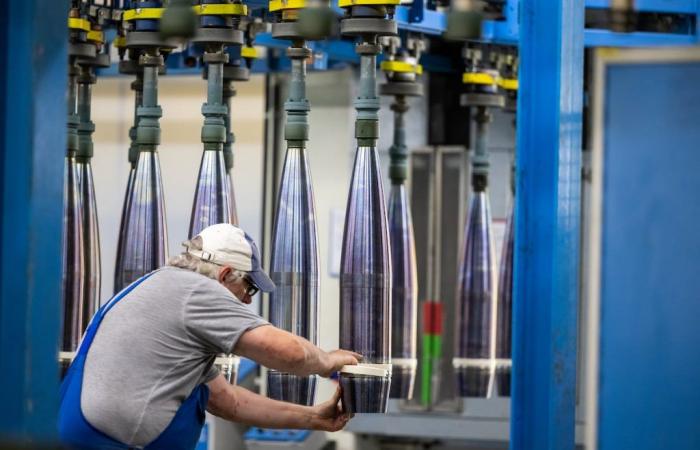
What for some is a bad streak, for others is an opportunity. The current imbalance in the German labor market has meant that while many companies are desperately looking for qualified labor, others, in industries such as the motor industry, are not going through their best moment and are forced to cut thousands of jobs.
This is the case of Continental, which like other suppliers in the automotive sector, is cutting its workforce. At the same time, Germany’s largest defense company, Rheinmetall, is desperately looking for personnel to cope with the huge increase in orders resulting from the war in Ukraine. According to Rheinmetall, it needs to fill 5,000 positions in Germany this year due to the high demand for defense equipment. This pushed both companies to recently agree to a collaboration so that Continental employees who are affected by the company’s reorganization can take jobs at Rheinmetall. If necessary, Continental will even offer further training to employees.
In the past, defense companies used to have a bad image among candidates, but the Russian invasion of Ukraine has made this controversial industry now seen in a different light. Hardly any other German company is growing as fast as Rheinmetall. This year alone, the Düsseldorf-based company, founded in 1889, expects a turnover increase of around 40% compared to the previous year. Consequently, the need for personnel is also increasing and it plans to increase its workforce – currently around 30,000 workers in 174 locations around the world – by more than 10%. It is not the only defense company on the rise. The sector is talking about the largest wave of hiring since the end of the Cold War.
Last year, the German group recorded a business volume of almost 7.2 billion euros (12% more than in 2022) and an operating result (EBIT) of 918 million euros (19% more than the previous year). The panorama is very different at Continental. The automotive supplier is suffering the consequences of the mobility transition from traditional combustion engines to electric cars. For this reason, it wants to eliminate thousands of jobs in the coming years. Specifically, almost a year ago, it announced that it would close its loss-making brake and suspension parts factory in Gifhorn at the end of 2027 and, since then, it has been looking for companies to take over part of the 900 employees. The plants in Schwalbach and Wetzlar in Hesse will also be closed.
For its part, Rheinmetall is building a new ammunition factory in Unterlüss, where production is expected to begin as early as next year. This town in northern Germany is already the defense company’s largest production center and is about 50 kilometers south of Gifhorn. In addition to ammunition, military vehicles such as the Puma infantry combat vehicle are also manufactured here. Thus, while the arms company is almost desperately looking for people with knowledge of metallurgy and electronics, Continental wants to get rid of precisely those specialists en masse.
“Continental and Rheinmetall have signed a memorandum of understanding on cooperation in the context of the revival of the defense industry. The aim of the agreement is to cover Rheinmetall’s rapidly growing personnel needs in the coming years partly with Continental employees affected by the transformation,” the two companies wrote in a joint statement. It will not be the only contract of this type.
“We are receiving well-trained people who come from a company with a similar culture and who understand us,” declared Rheinmetall’s human resources director, Peter Sebastian Krause, who also announced that they are working on other similar collaborations “with other industrial partners of Rheinmetall.” renown from a wide range of sectors.”
The collaboration will last until 2028 so that all workers who wish can receive the appropriate training courses to change companies. “The profound changes taking place in all sectors can only be overcome together,” said Ariane Reinhart, Human Resources Director at Continental. At the moment, Rheinmetall has already organized several job fairs in Continental subsidiaries where at least 500 employees showed their interest, mainly software engineers, according to statements from the company to the German newspaper Süddeutsche Zeitung.
Other companies will also benefit from Continental’s restructuring. The construction technology manufacturer Stiebel Eltron had already announced that it would take over part of the Gifhorn plant and 300 employees to manufacture parts for heat pumps there in the future. Meanwhile, Siemens Mobility wants to hire up to 100 employees for its railway technology plant in Braunschweig.
Since the start of the Russian war of aggression against Ukraine, more than two years ago, NATO countries have allocated a lot of money to renew their armies, including the German Government, which agreed in 2022 to a special fund of 100 billion euros to modernize its army in the face of the Russian threat. Rheinmetall is one of the companies that benefits from the increase in this demand and the new change of era that the German Chancellor, Olaf Scholz, spoke about at the beginning of the war, and that the German Defense Minister, Boris Pistorius, has emphasized throughout. moment since then when implementing his plans to reform the German Armed Forces to make them more efficient and for the country to be, as he himself points out, “prepared for war.”
This change in times prompted the German company to sign a three-year advertising agreement with the Borussia Dortmund football club shortly before the Champions League final. However, he underestimated the opposition from fans who did not welcome the news. A wave of criticism was unleashed against the club, pointing out that advertising by arms companies has no place in stadiums. In his opinion, supporting Ukraine and strengthening Europe’s defense capabilities is not the same as “normalizing” wars and weapons.
Specifically, Rheinmetall sells tanks, artillery, air defense systems, military trucks and ammunition. According to the group, its order book reached another all-time high in 2023 with 38.3 billion euros, which represents an increase of 44% (in 2022 the figure stood at 26.6 billion euros). But in addition to replenishing and modernizing NATO arsenals, Rheinmetall also manufactures military equipment for Ukraine and founded in October 2023 in kyiv a joint venture with the Ukrainian state company Ukrainian Defense Industry JSC (formerly Ukroboronprom): Rheinmetall Ukrainian Defense Industry LLC. Currently, maintenance and repair work is already being carried out on combat vehicles.
In a second step, armored vehicles such as Fuchs armored personnel carriers, Lynx infantry fighting vehicles and Panther main battle tanks will also be manufactured in Ukraine. Likewise, this week Rheinmetall reported that it wants to combine the “Skyranger” air defense system with the Leopard 1 tanks supplied by Germany to defend against drones. Ukraine has already received 50 Leopard 1 A5 tanks since the start of the Russian war of aggression, but not with this special equipment.
Follow all the information Five days in Facebook, x and Linkedinor in our newsletter Five Day Agenda
Newsletters
Sign up to receive exclusive economic information and the financial news most relevant to you
Sign up!





